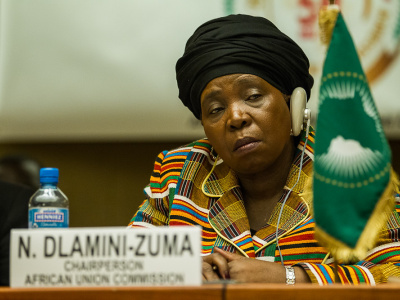
Assisting regional institutions and farmers’ organisations for inclusive regional value chain development
Developing regional markets and promoting investment through public-private-partnerships (PPP) are becoming fashionable approaches to pursue food security objectives in Africa, as shown in the commitments of African Union Heads of State in the Malabo Declaration.
Many bottlenecks remain, however, both in terms of policy reforms implementation and asymmetric benefits for farmers and operators along agro-food value chains.
Establishing platforms to enable regular, regional-level public-private dialogues and PPPs could support agricultural and trade policy reforms, encourage public and private investments in the agricultural sector, and make agro-food value chains more inclusive. Although policy dialogues are necessary to ensure that national institutions support regional initiatives, the participation of the private sector in such deliberations is also crucial to address its concerns and gain its support for regional integration. The CAADP provides a good framework to guarantee a truly multi-stakeholder process by including all relevant actors, and so it could ensure that smallholders benefit from regional integration.
Over the past few months, ECDPM has intensified its efforts to assist regional institutions and farmers’ organisations for inclusive regional value chain development.
COMESA Agriculture Investment Forum
Francesco Rampa attended the first ever COMESA Agriculture Investment Forum from 13 to 15 October in Livingstone, Zambia. On this occasion, the COMESA Secretariat re-launched the process to design the COMESA CAADP Regional Agricultural Investment Plan. The Forum was well attended with strong presence of the private sector, including agro-food processing companies, agricultural input suppliers, and some banks and investment funds. There was an interesting “B2B session” where some companies engaged in serious discussions about potential business partnerships.
In Livingstone, the COMESA Secretariat announced that the COMESA CAADP Compact would be signed at the November Joint Ministerial Meeting in Kinshasa. Francesco presented the work on regional agro-food value chains that ECDPM is conducting in collaboration with the Eastern African Farmers Federation (EAFF) and other partners, which is contributing to an investment programme that the COMESA Secretariat is developing as an early deliverable.
Eastern African Farmers Federation
EAFF is an entrepreneurial, pro-active and business-oriented stakeholder in regional agricultural policy processes in the EAC, IGAD and COMESA. ECDPM is supporting EAFF to develop a regional information system on marketing and trade, or “Toolbox”, to disseminate:
(a) information on agro-food markets as well as policies and regulations concerning these markets, enabling farmers to make informed decisions, and
(b) knowledge and practices, supporting farmers in procuring inputs and services and in marketing their products.
This Toolbox could greatly contribute to strengthen existing market information systems and agricultural advisory services in Eastern Africa and ensure that critical information and services are delivered to smallholder farmers.
International donors have increasingly paid attention to the needs of agricultural producers in terms of access to regional markets and the business environment in which they operate, especially when farmers’ organisations have pro-actively sought solutions and engaged in policy processes.
[caption id="attachment_15009" align="alignleft" width="202"] Fabien Tondel and Steve Muchiri EAFF[/caption]Last week, Fabien Tondel organised and participated in meetings with the CEO of EAFF and European development partners, including the Dutch Ministry of foreign affairs and the European Commission’s Directorate for development cooperation, to discuss approaches to support non-state actors in regional agricultural development processes in Eastern and Southern Africa, in particular in the context of regional value chain development initiatives. One of the topics discussed was the Global Agricultural and Food Security Program (GAFSP) and its private sector window, to which the Dutch government is a large contributor. Although the disbursement rate of this private sector window has so far remained relatively low, the GASFP, which is intended to benefit smallholder farmers, could present opportunities for initiatives led by regional farmers’ organisations such as EAFF. New bilateral programmes such as the Dutch Good Growth Fund could also support initiatives of non-state actors in the implementation of CAADP.
The European Commission is now in the process of consulting with African regional economic communities (RECs) to elaborate Regional Indicative Programmes under the 11th European Development Fund (EDF11). These programmes will finance regional integration, trade facilitation and private sector development interventions in COMESA, the EAC and IGAD. It is crucial for RECs and non-state actors such as EAFF to formulate regional CAADP investment plans in coordination and in a timely manner so as to harness these EDF11 resources for the implementation of CAADP and the development of regional value chains.
Ensuring that the policy processes of the RECs and good investment propositions from public institutions and the private sector meet the requirements of donors’ programming processes, and vice versa, that donors align their development assistance with the priorities and strategies of African CAADP actors, cannot be taken for granted. This will require a sustained dialogue, carefully planned processes on every side and sometimes some creativity so that resources and good ideas meet.
But business as usual is no longer an option given the imperative for CAADP to deliver developmental outcomes in the wake of the Malabo Declaration and increasing constraints on development partners’ resources. Including all the stakeholders who will be able to deliver these outcomes is imperative as well.
ECDPM will keep working with COMESA, EAFF and other public and private actors in the coming months to make public-private platforms for regional value chain development a reality in Eastern and Southern Africa.


